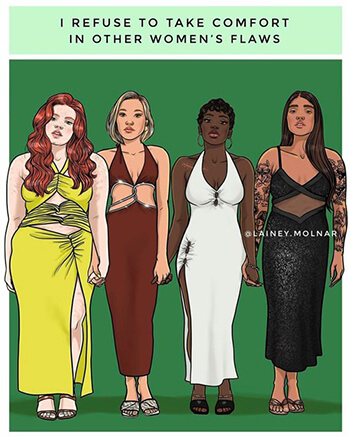As some of you may already know, the month of March celebrates Women’s History Month. What better time than now to explore our conceptualization of feminism.
Some hold onto feminism as part of their identity.
Others avoid being associated with the term in any way.
However you feel about the “F-word,” American culture, our families and our education have impacted our outlook more than we may know.
As a therapist I believe our identities are largely sculpted by the messages our society and culture send us. These external messages combined with our life experiences impact how we define ourselves.
Because of this, it’s difficult to isolate our own self image from the ideal self image fed to us by our external environment.
It becomes impossible to “measure up.” This can lead to feelings of inadequacy and inferiority.
And it’s why I believe that cultivating a compassionate inner dialogue can look a lot like feminism.
How feminist waves led to the “F-word”
Women have been pissed at the patriarchy for a long time, and for good reason. As many of us already know, women have been treated, at home, at work, in relationships and in political and legal settings, more as property than as partners.
It wasn’t until women were able to collectively stand against the oppressive norms that they became harder to dismiss and ignore.
While this is a major summarization of the overall progression of women in history, I’ll outline a few critical moments in time: there were the suffragettes of the late 1800s and early 1900s, then the era between the ‘60s and the ‘80s when women gained the right to abortion and our anger at the patriarch got louder.
Then came the third wave of the ’90s involving Anita Hill’s testimony that Supreme Court Nominee Clarence Thomas has sexually harassed her at work. This period is also when Kimberly Crenshaw’s ideas of intersectionality took root, a term which describes ways that different kinds of oppression can become layered.
And now we find ourselves in what many consider the fourth wave of feminism. It’s a movement based more online than on the streets and so far defined by Time’s Up and the #MeToo movement.
What does it mean to identify as a woman in this current time and place? And how does that impact our wellness?
In a survey done by Psychology Today, surveyors asked, among other questions, “Why is feminism considered the “F-word” by so many young people today?”
Student Andrea Dottolo answered, “A movement of powerful women is seen as threatening. Reflecting that, the media creates negative stereotypes of these powerful women: Who would want to be a bra burner?”
Though not part of the younger generation, my mom is a perfect example of someone who believes this.
 Clichés and my mom’s kind of feminism
Clichés and my mom’s kind of feminism
It wasn’t until I was a little older that I realized my mom had a complicated relationship with feminism. She’s one of those people who fear being associated with the word.
I think of her as strong, independent, confident and capable. She maintained a sense of self while running a business, and after her marriage ended, caring for four kids on her own.
After growing up and realizing just how hard it is to meet my own needs, I can’t imagine the strength it took my mom to run a successful business, care for herself and the four of us.
I would watch my mom bravely stand up for herself in male dominated environments, and often times her approach would lead with the perspective “‘I’m not a feminist but…”
I realized then that her ideas of feminism were rooted in a historical and outdated context: the Reagan-era bra burners.
And by the way, bra burning never took place on a large scale, it was more of a symbolic gesture to reject objects that objectified women.
We won’t go too deep down this rabbit hole, but basically the idea of man-hating bra burners came from a protest over the Miss America pageant in 1968 and its demeaning treatment of women.
To the protesters, bras were a symbol of the objectification women experienced too often, so they threw away bras and held up signs such as “All Women are Beautiful” and “Can make-up hide the wounds of our oppression?” to protest this patriarchal treatment.
The media purposely painted these women protesters, who were standing up for their beliefs, as radicals.
Humor columnist Art Buchwald wrote that if American women gave up their beauty products, “there would be no reason for the American male to have anything to do with her at all.”
If you pointed out the inequality you were experiencing, you got labeled as a shrill, lonely, and hairy-legged feminist who hated all men.
This is the type of feminism my mom grew up with.
Once I knew more about this context, I got angry. Not exactly at her, but how the feminist movement has played out.
The patriarchal reaction to those women protestors was to find another way to suppress women- by pitting them against each other. And by characterizing these women as undesirable.
Each time we conform to the expectations of the patriarchy, we are perpetuating it.
For instance, my younger sister is an airline pilot, and therefore a minority in her field.
If she in any way acts “too defensive” in the cockpit when sexist jokes and micro-aggressions are thrown around, she risks being labeled as a b****.
So, what does she do?
She ignores the jokes and she conforms in order to have a more pleasant work relationship and hopes to eventually educate these co-workers once she is accepted by them.
This is total BS. Is she to blame? No!
She’s just trying to make her work experience with coworkers bearable.
But I believe there are more options than either conforming or being labeled as a “man-hater.”
 How outside messaging impacts our identity as women
How outside messaging impacts our identity as women
Challenging our core beliefs and where they come from can help us look at our identity as women in new and more helpful ways.
I don’t want to get too existential here, and I think it helps to understand the messages we receive as a culture and how we interpret those messages.
These messages impact our self-image. And like a filter, our internal messaging interprets these outside stimuli and sends us information to support our core beliefs.
For instance, let’s say a woman is struggling with low self-worth when she comes to therapy. She gets her self-worth from external validation, and maybe from men in particular.
Maybe she received reinforcement for looking and acting a certain way. Maybe social approval came when she did things like laughed at sexist jokes or smiled when she really felt like crying.
Maybe she acted in certain ways that felt inauthentic and went against her instincts in order to avoid being called “dramatic” or “emotional” or “too much”.
External systems, such as the patriarchy, create and reinforce this messaging.
External systems, such as the patriarchy, can create core beliefs that make us feel inferior, worthless and dependent.
Once we take hold of a core belief, our lens filters out anything that contradicts it.
We can use the idea of a “lens filter” as a tool to re-shift core beliefs into something more positive, leading the lens to filter IN positive input instead.
We can use self-compassion to reframe that input.
So, in our example, the woman we mentioned above can start to intentionally re-write her inner dialogue to say that she IS enough, she IS brilliant the way she is. She doesn’t need to conform to the socially imposed patriarchal expectations.
Her internal lens starts to filter out unhelpful information and instead reinforce this new, positive belief.
Trust me, I know, it’s easier said than done. It can be done. It starts with understanding where those external messages come from, and acknowledging that they are not facts.
 Free yourself from limiting beliefs
Free yourself from limiting beliefs
By asking ourselves where our limiting beliefs come from, we can examine the cultural messaging that our filters are either letting in or keeping out.
How do our internal filters continue to let in data that supports our own worthiness as women? Can we notice when our filters lead to feelings of inadequacy and of being “too much” or “not enough”?
It helps to remember why we’re so hard on ourselves: because these oppressive messages were created by those in positions of power who are afraid to lose it.
By using self-compassion, we can move past these limiting beliefs.
For some of us, they’ve been reinforced by society’s messaging over and over again.
Self-compassion can remind us that we’re experiencing this as a collective, and it’s okay to feel frustrated and angry. Or apathetic.
Some recommend “fierce self-compassion,” which involves protecting yourself in an unapologetic, fierce way.
I invite you to practice self-compassion in whatever way feels good to you.
It can start with recognizing our negative belief filters. Just seeing what you absorb and what you ignore.
Recognize those moments in your life when you felt grounded, appreciated and honored for your uniqueness.
The moments in your life where you felt free of comparisons made between yourself and others. The moments you succeeded in things you were good at, the moments where you felt joy, and felt truly seen and appreciated for qualities you value in yourself.
Changing our core belief must start with the understanding that the messages that scripted our internal “self-critic” may have been built with faulty information.
This awareness gives us permission to challenge and rewrite those historical tales.
Self-compassion in a feminist light
On a daily basis feminism can serve as a reminder of the system we live in.
It’s a reminder to check ourselves when we hear a negative inner critic and hold curiosity for this. Explore this negative self-talk and ask if it comes from a culture that was built to hold women down.
And speaking of lifting other women up, this new wave of feminism is intersectional. Meaning, “it’s queer, sex-positive, trans-inclusive, body-positive, and digitally driven,” according to Vox. It’s holding powerful men accountable for their actions.
It also takes into account that white women often hold more power than most marginalized groups.
Take a stand against the patriarch.
Be a feminist by not allowing your inner dialogue to put you down and call you hurtful things. It involves being compassionate to yourself, for who you are. And then to your sisters.
Feminist and protestor Carol Hanish reflected on this idea after the famous Miss America pageant in 1968. She wrote, “one of the biggest mistakes of the whole pageant was our anti-womanism…Miss America and all beautiful women came off as our enemy instead of our sisters who suffer with us.”
It’s an idea that artist Lainey Molnar illustrates in her artwork below.
Exploring feminism through Wildroots
In our mission for Wildroots Collective we focus on ways you can feel more empowered.
We believe that this empowerment can stem from having an understanding of the contemporary social, economic, cultural and academic issues and what they mean to you.
I hope to continue this conversation about what it might mean to each of us and to help you along your journey. From therapy, to life coaching to yoga and astrology readings, Wildroots is here to support you in your mental and physical wellness.
Reach out to kari@wildrootscollective.com to find out how our services can benefit your “F-word” journey.
Resources
https://www.vox.com/2018/3/20/16955588/feminism-waves-explained-first-second-third-fourth


 Clichés and my mom’s kind of feminism
Clichés and my mom’s kind of feminism How outside messaging impacts our identity as women
How outside messaging impacts our identity as women Free yourself from limiting beliefs
Free yourself from limiting beliefs

